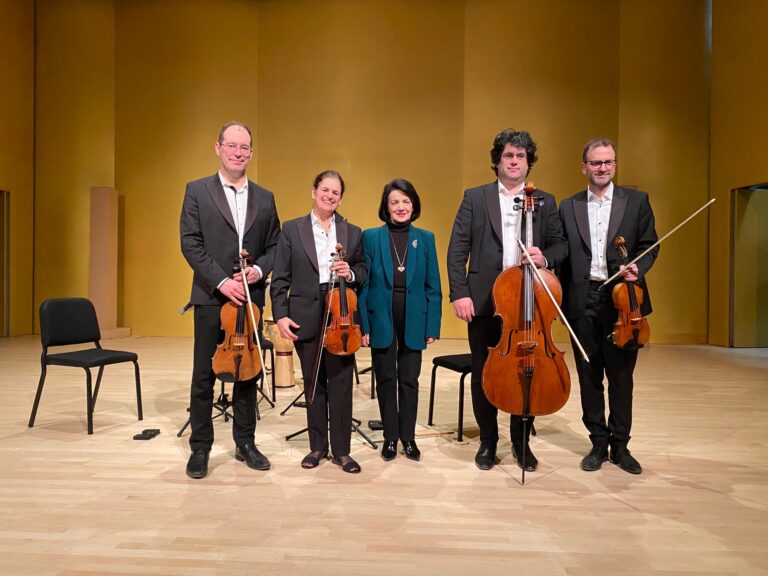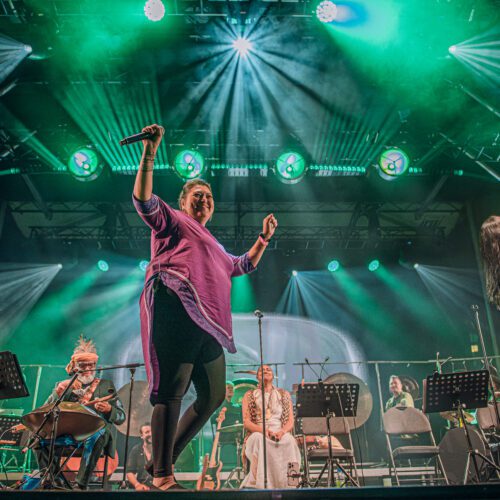The three-day event Le quatuor selon Ali Zadeh (The quartet according to Ali Zadeh), organized by the Molinari Quartet, reached its climax on Saturday evening, February 15, at the Salle du Conservatoire de Montréal. In the presence of the composer, a small, elegant woman of 78, we listened, probably for the very first time, to all her string quartets in one go. This was made all the more special by the fact that it included the premiere of a work written specifically for the Molinaris, her Farewell quartet.
WATCH THE INTERVIEW WITH OLGA RANZENHOFER FROM THE MOLINARI QUARTET (In French)
After a full and fast-paced introduction by multidisciplinary artist Nicolas Jobin, who is also a “specialist” in the work of Franghiz Ali Zadeh, the seven quartets by the Azerbaijani composer were launched in non-chronological order, contrary to the Molinari Quartet’s usual practice for this kind of event. An idea of Mrs. Ali Zadeh’s which, I think, turned out to be a happy one, as it favored an alternation between harmonically “modernist” works and those more openly “folkloric”.
I won’t summarize each piece here, but the final impression of the many listeners present is probably that of an authentic fusion, sophisticated without abstruse cerebralism, of Eastern and Western musical universes. The language of Azeri sacred chants, called mughams, is omnipresent in Ali Zadeh’s expressive palette, but with variations in intensity and explicitness depending on the quartet. While 2015’s Reqs (Dance), and especially 1993’s Mugham Sayagi, her most famous work (commissioned by Kronos), are strongly tinged with what Western ears perceive as obvious orientalism, others such as Dilogia (1974, rev. 1988), In Search Of… (2005), and even the premiere Farewell (2025) are more strongly in the wake of chromatic modernism, or even the Second Viennese School (Farewell is explicitly inspired by Alban Berg’s Violin Concerto). That said, even in these, the soul of an art music linked to Islamic sacred chant remains perceptible, for those who know how to listen.
Franghiz Ali Zadeh’s music is an authentic fusion, a brilliant syncretism, all the more natural as it has been personally experienced by the artist throughout her life (Nicolas Jobin’s lecture was very enlightening in this respect). This music is even more powerful in its expressiveness because Ms. Ali Zadeh possesses two additional major assets: firstly, she is an excellent musical narrator, who knows how to tell stories with sufficient focus to set a lively scene, but also to leave interpretative space, both for the musicians and for the listeners, so as to allow each and every one to immerse themselves with a certain freedom of perception. Secondly, Ali Zadeh is a fine colorist, using almost the entire palette of string techniques such as col legno battuto, tremolos, glissandos, pizzicatos, mutes and so on. Elsewhere, the musicians sing, or (in Mugham Sayagi) also play percussion, moving around the stage and playing backstage. The rhythms used by Ms. Ali Zadeh, often demanding but propulsive, endow her music with an infectious accessibility.
For this ease of reception, combined with an elaborate academic knowledge and structural complexity that is anything but obtuse, Franghiz Ali Zadeh’s musical proposal is one of the most inspiring of our time, and perhaps one of the most promising for the future of contemporary creation.
This kind of world-class event (which also included two previous days of conferences and discussions) is a landmark event. The Molinari Quartet gave us the kind of privilege that music lovers in Berlin, Vienna or Paris know so well. The ensemble has benefited from the support of a far-sighted and essential patronage (the Lupien Family Foundation), to which we are grateful.
I’ll end with an arrow aimed at a few media “competitors” (forgive me, but you’ll understand): to my knowledge, no one from Radio-Canada, La Presse or Le Devoir was present. This just goes to show the deplorable cultural state of the mainstream media, unable to grasp the unique and historic nature of this event.
























